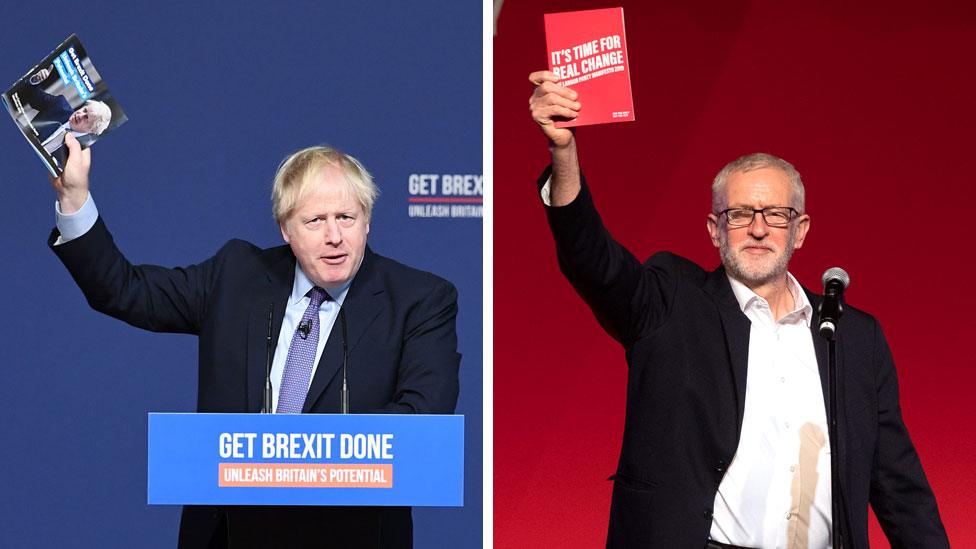General election 2019: John McDonnell underlines Labour pledges on inequality
- Published
- comments
McDonnell: Labour will lay 'foundations of a new economy'
Labour shadow chancellor John McDonnell has outlined his party's pledges on inequality, blaming 10 years of Tory government for increased living costs.
In a speech in the West Midlands, he said Labour's plans could save families more than £6,700 a year, although experts have questioned this figure.
He reiterated measures including raising the living wage to £10 an hour and scrapping universal credit.
But the Tories said Labour's "reckless pledges" will mean higher bills.
And last month influential research group the Institute for Fiscal Studies (IFS) said neither the Conservatives nor Labour were offering "credible" spending plans ahead of the general election on 12 December.
Speaking at an event in Birmingham Mr McDonnell said his party wanted to "abolish poverty once and for all", saying the level of inequality in Britain was not reflective of a country with Christian roots.
"Children going hungry and homeless in the fifth largest economy in the world begs the question: are we really living up to the values of Christianity - or any other of our religions or beliefs for that matter?" he said.
"We don't believe it's enough to offer people a hand up out of poverty. We want to abolish poverty.
"That's why we committed in our manifesto to abolishing in-work poverty within five years."


Labour's figures for boosting household income may not stand up to close scrutiny - mixing immediate benefits with less certain promises of lower utility bills in future.
But the political message that "you will be better off with Labour" is seen by some party insiders not only as essential, but overdue.
John McDonnell's speech was in the West Midlands - part of the country where traditional Labour voters who backed Brexit are showing more willingness to support the Conservatives this time.
And they need good reasons to. In union leader Len McCluskey's words: "Come home to Labour."
It was felt that Labour's myriad "retail offers" - from free broadband to reducing rail fares and offering free prescriptions and dental checks - hadn't been quite as popular as anticipated.
So the announcements are being repackaged, to get across the message that the party will put money in your pockets, unless you are already well-off.
This in part was due to Labour being put on the back foot on its tax plans, getting bogged down in arguing over whether anyone outside the top 5% would be worse off.
Now the party wants to go on the front foot and stress that the message isn't so much "you won't pay any more", it is: "overall, you will benefit."
Another problem is that voters are sceptical that Labour can deliver.
So over the next week, expect to see more details on how Labour will prioritise its programme.

Attacking the Conservatives, Mr McDonnell said: "While wages are still lower than before the financial crash, inaction and economic mismanagement by the Conservatives and the Liberal Democrats over the last decade has meant the cost of living for most households has actually soared."
He said Labour's manifesto will "tackle the burden of rising living costs".
Mr McDonnell added that, over the next few days, he would put together an outline of what the first 100 days of a Labour government would look like.
"We want to hit the ground running," he said.
"We can't wait for the implementation of those policies because they are so desperately needed."
Chief Secretary to the Treasury, Rishi Sunak, said: "It defies belief that Corbyn's Labour are claiming they would reduce living costs at the same time as standing on a manifesto containing tax rises which would hit ordinary hardworking people across the country."
He said the Conservatives have pledged to cut taxes and will introduce "record increases" in the National Living Wage, adding: "Labour can't be trusted with the economy and their reckless pledges will mean higher bills and more tax for everyone."
Liberal Democrat shadow chancellor Ed Davey said Mr McDonnell's promises were "worth nothing as long as Labour is committed to negotiating Brexit".
"Either a Tory or Labour Brexit would mean less money in people's pockets and less tax revenue to fund our public services," he said.
- Published28 November 2019
